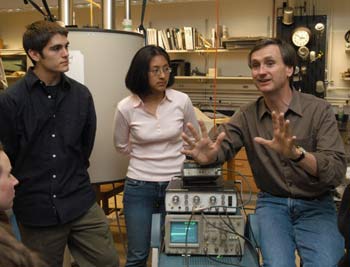Distinguished Teacher: Jeffrey Reimer
Chemical Engineering
![]()
23 April 2003
| |  Jeffrey Reimer, right, professor of chemical engineering Peg Skorpinski photo |
When teaching freshmen the wonders of chemical engineering, Jeff Reimer has been known to bring his Yamaha 750 sport bike into class to discuss catalytic converters and fuel-injection systems. “I admit it’s a little bit of grandstanding, but students get interested when they can see the result of what they’re studying,” he says.
Similarly, he draws upon his love of cooking (students give a unanimous thumbs up to his pizza-from-scratch recipe) to jump-start discussion of the work chemical engineers do — in this case, scaling up food production to industry.
Reimer has thought a lot about what it means to teach and how to measure success. He constantly tweaks his approach, and considers teaching a continuing experiment. Said one former student: “I have never known any teachers who viewed teaching with such dedication to their students, and with such devotion to the analysis and continual improvement of his own method of teaching.”
When a difficult introductory class seemed to be driving away many potential ChemE majors, Reimer took it upon himself to write a more lively textbook for it. Thanks to the new tome, he says, “I’ve noticed in the courses I teach that I now have far fewer students dropping out. I see a lot of these people at graduation.” His co-author, Mike Duncan at Cornell University, reports similar success. The book, now in its third printing, has captured about 10 percent of the market for introductory chemical-engineering texts.
Reimer continually draws on current events, such as environmental spills, to make potentially dry classes come alive. “He makes a concerted effort to discuss the social contexts of chemical engineering,” one former student says. Reimer’s own research on materials for solar cells, fuel cells, and batteries provides many real-world examples. As a motorcycle enthusiast, he notes, it’s ironic that this work “is aimed at eliminating the internal-combustion engine.”
Reimer insists on learning each student’s name, even when he has 150 of them in his introductory Chemical Process Analysis class. He encourages — no, demands — class participation by calling on students regularly to summarize concepts or answer questions.
“At the very beginning of the semester, it’s a negative experience for students. I get a lot of mail and e-mail saying they really hate this,” he reports. “The trick is how you speak to people when you call on them. By the middle of the semester, people realize I will not put them in a position where their peers can make fun of them.” The practice of calling on students is “invaluable,” he says. “I get feedback all the time about what students know and don’t know.”
Not surprisingly, Reimer has not only created a course to teach graduate students how to teach but has since developed it into a graduate seminar — now required in the department.
“Professor Reimer contributes in important ways to the education of the next generation of socially responsible engineers,” says Arup Chakraborty, chair of chemical engineering. Reimer himself sums up his teaching philosophy by quoting educator Henrietta Mears: “A teacher hasn’t taught until a student has learned.”
More: Jeffrey Reimer's Statement of Teaching Philosophy
— Robert Sanders

